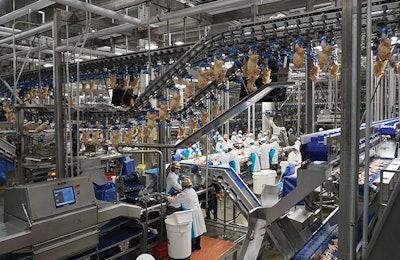
Six months after its grand opening, Lincoln Premium Poultry’s $450 million poultry processing operation is sending products to market. Soon, it expects to supply all of Costco Wholesale Corp.’s locations in the western U.S.
“There were a lot of folks who doubted that we could do this,” Walt Schafer, Lincoln Premium Poultry’s chief operating officer, said. “I will say we did do it.”
A new way to do business
The operation is a significant departure from the established poultry supply chain model in the U.S.
Founded in 2016 and designed to exclusively supply Costco, Lincoln Premium Poultry (LPP) was set up in Fremont, Nebraska, in collaboration with the Issaquah, Washington, retailer to operate and manage the asset and the business on Costco’s behalf.
In practice, it is a miniaturized version of a traditional poultry integrator with only one customer: Costco.
In March 2020, the 400,000-square-foot poultry processing facility located in Fremont employed more than 1,000 and was running three lines processing about 1 million birds per week. At the time, it just launched a second shift on one line. Its plans call for running two shifts on three lines and processing more than 2 million birds per week by the end of 2020.
Costco’s interest in poultry
According to Jessica Kolterman, LPP’s director of corporate and external affairs, Fremont is currently supplying all fresh chicken products sold under the store’s Kirkland Signature brand – including the famous rotisserie chicken – to Costco’s stores in Omaha and Lincoln, Nebraska. LPP will eventually supply chicken for all its stores in the western U.S.
Kolterman declined to say how the fledgling chicken operation is impacting Costco’s bottom line but said the operation wouldn’t exist if it didn’t make sense for Costco. LPP, she said, gives Costco more than a chicken raised to a specific weight and size for rotisserie roasting.
Costco has tremendous influence in how the bird is raised, housed and fed; the level of animal care; the processing environment and LPP’s employment practices. Moreover, the new processing operation is utilizing top-of-the-line equipment from start to finish in order to maximize bird welfare and minimize labor needs.
“From (Costco’s) perspective, it wasn’t just about getting a bird at a certain price or having the economics be perfect,” Kolterman said.

The plant uses air chilling. Proponents of the practice say it reduces the amount of water in chicken meat, better preserving flavor and tenderness. (Photo by Austin Alonzo)
Inside the plant
The most difficult part in getting off the ground, Shafer said, was taking the entire LPP operation from the drawing board to reality. This meant literally building an integrated poultry enterprise from the ground up, as well as staffing it up as soon as the plant opened its doors, and figuring out all the new, high-tech equipment and its affiliated software.
The processing plant is outfitted almost entirely by Dutch food processing equipment company Marel. When its birds arrive in an indoor lairage area, they are moved in their transport modules onto a conveyor belt which takes them into a controlled atmosphere stunning (CAS) system. The CAS is used to enhance bird welfare and reduce stress on workers.
After slaughter, plucking and evisceration, the birds are air chilled. Kolterman said the practice is more sustainable because it uses less water than conventional chilling. Additionally, consumer feedback indicates a preference for the taste and texture of air-chilled chicken meat.
Birds then move past a high-speed camera which informs automated deboning operations further down the processing line. Some are wrapped and injected with seasoned brine for rotisserie roasting. Others are cut up and packaged in Costco’s so-called saddle packages. After processing, robot arms help with stacking and loading.

Advanced automated deboning systems, which cut the bird based on its body’s proportions, allow shrink the number of workers needed to harvest breast meat and tenders. (Photo by Austin Alonzo)
Everywhere, special attention is paid to sanitation. Evisceration and slaughter are divided from the processing floor. Employees pass through a boot wash and wash their hands before and after working in the processing area. Corridors with windows run throughout the plant to both allow visitors to see into the plant and to separate its departments.
On the farm
In the field, Kolterman said LPP contracts close to 80 independent growers. It divided operations into farms that house breeders, those that house pullets and those that grow birds to about 6 pounds. In total, 520 barns will be involved. Half are currently up and running.
The live operation is supported with a veterinary and technical staff. LPP’s contract is 15 years long and the farmers are responsible for housing and raising the birds. The compensation contract is inspired by a guaranteed base-pay concept, so LPP can reward above-average performance without punishing below-average performance.
LPP buys purebred chicks from Aviagen which are grown on pullet farms. When mature, they go to breeder farms which produce fertile eggs. The eggs are then hatched at a 90,000-square-foot hatchery located near the processing plant in Fremont. It buys grain from Archer Daniels Midland Co. which it processes at its Fremont feed mill. The mill holds more than 17,500 metric tons.
Kolterman said the birds are raised antibiotic-free, but the company follows a policy of antibiotic stewardship and will treat when necessary. On an anecdotal basis, she said the birds are reacting well to the locally grown feed stock and are reaching the desired size quicker than expected. Birds were expected to finish in 45 days but are instead ready in 41.
Boosting the local economy
Kolterman said LPP is attracting employees from the Fremont and Omaha areas, and it is making a broader impact on the regional economy. Between April 2019 and February 2020, it added more than 800 employees. Workers are paid a higher starting wage at LPP than at competing manufacturing facilities, which is motivating other nearby employers to raise their pay in order to compete.
Further afield, LPP’s growing contract gives local farmers a new income stream and a new source of nutrient rich fertilizer. Kolterman said many growers are using the opportunity to support their families and keep their children farming.
Moreover, the business is pumping cash directly into the local economy by creating new demand for products and services and by putting existing businesses and contractors in the region to work. She estimates the total economic impact for the region to be about $1.2 billion annually, or about 1% of the Cornhusker State’s gross domestic product.

Lincoln Premium Poultry uses a controlled atmosphere system to irreversibly stun birds. It brings ergonomic and welfare benefits. (Austin Alonzo)
Costco and LPP’s future in the poultry business
Kolterman acknowledged there is speculation about Costco copying the Fremont model elsewhere. For now, she said the focus is on getting the Fremont plant and LPP’s poultry growing operation running smoothly.
“At this point, that’s where the conversation has stopped,” Kolterman said. “There will be a day in the near future when this place runs like a well-oiled machine. When we get to that point, and that efficiency is shown through this model that Costco is looking at, then they will say what their future holds.”

















